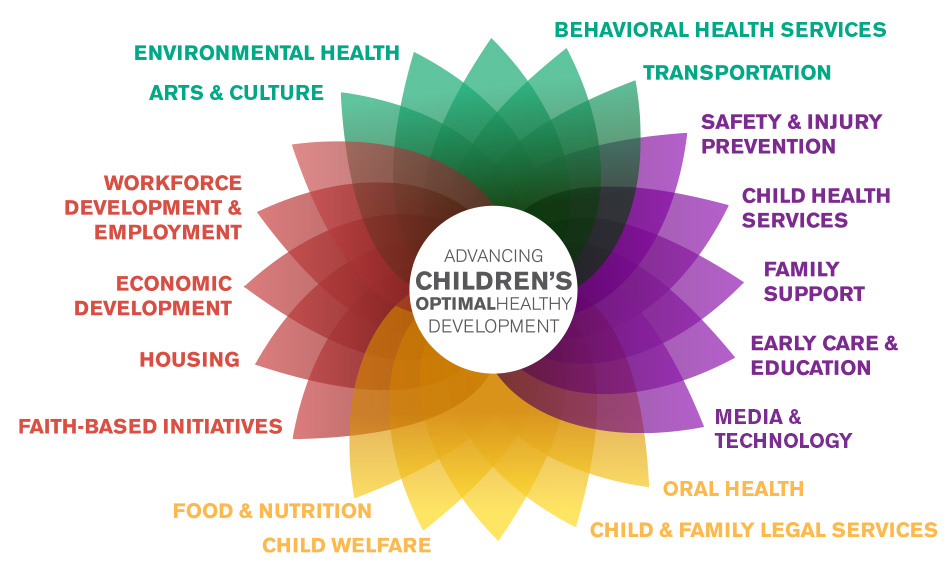A child's oral health forms the foundation for their overall growth and development. From their first tooth to their teenage years, caring for their teeth and gums is about more than just preventing cavities—it’s about creating habits that support lifelong health. In recognition of Children’s Dental Health Month this February, it's an important reminder that oral health plays a crucial role in supporting children’s overall development, including speech, nutrition, sleep quality, academic performance, emotional well-being, and self-esteem. Strong oral health not only helps children thrive during their formative years but also sets the stage for a healthier adulthood.
Oral Health as a Key Driver of Healthy Development
At the Office for Community Child Health (OCCH), we view oral health as a cornerstone of a child’s well-being. We recognize that poor oral health is not isolated; it is deeply connected to other social determinants of health, such as education, family support, nutrition, and access to health services—each of which influences a child’s well-being. For example, children with untreated dental issues have a higher risk of missing school due to pain or dental visits, which can impact their school performance, as well as future career opportunities.
OCCH has been addressing this challenge through collaboration. For instance, we’ve partnered with the Education Practices program at OCCH and the Connecticut Dental Health Partnership (CTDHP), the dental plan for Husky Health. Together, we’ve made significant strides in improving children’s oral health by integrating dental care into pediatric visits. Thanks to these partnerships, pediatricians are now able to provide preventive oral health services, educate families, and identify dental issues earlier—ensuring children receive the care they need at the right time.
Starting Early: Building Strong Dental Habits from Day One
Starting dental care early can make a significant difference in a child’s health and development. Experts recommend that children have their first dental visit by age one and begin brushing as soon as the first tooth appears. Even before a baby’s first tooth erupts, parents can begin promoting oral health by gently cleaning the gums with a clean, damp washcloth. This not only keeps their mouth healthy but also helps babies get used to the habit of oral care early on.
Good oral health is also critical for proper speech development and nutrition. Dental pain or missing teeth can make it difficult for children to eat nutritious foods, potentially affecting their growth and energy levels. Moreover, untreated oral health problems in childhood can carry over into adulthood, increasing the risk of chronic conditions like heart disease and diabetes. By prioritizing early dental care, parents can help set their children on a path to lifelong health.
Practical Tips for Parents: Making Oral Care Fun
Helping children develop positive dental habits doesn’t have to be a chore—it can be fun! Here are some practical tips for parents:
- Start Early: Clean your baby’s gums with a soft, damp washcloth after feedings, even before they have teeth. Once their first tooth appears, switch to a soft-bristled toothbrush and use a rice-grain-sized amount of fluoride toothpaste.
- Brush Together: Make brushing a family activity by brushing your teeth together with your child. This helps model the behavior and makes oral care feel like a shared, positive routine.
- Use Characters They Love: Incorporate your child’s favorite cartoon character into their oral hygiene routine. For example, use toothbrushes and toothpaste featuring beloved characters or watch a short video of their favorite character brushing their teeth.
- Sing or Play Music: Use a two-minute song or a brushing app to make the process more enjoyable and ensure they brush for the recommended amount of time.
- Reward Consistency: Create a sticker chart to track brushing and flossing, offering small rewards for meeting goals.
- Make Dental Visits Fun: Talk positively about dental visits, and consider bringing a favorite toy or book to help your child feel comfortable.
- Ask Your Pediatrician: Parents should also remember to ask their pediatrician about their child’s oral health during regular visits. Pediatricians can provide guidance and connect families with dentists, ensuring any potential issues are addressed early.
Instilling these habits early helps children maintain good oral hygiene as they grow, supporting their overall health and confidence.
Oral health plays a vital role in a child’s overall development, impacting their physical, emotional, and social well-being. Parents, caregivers, and communities all have a role to play in promoting good oral health. By starting oral care early, making brushing and flossing fun, and prioritizing regular dental visits, families can set children on a path to lifelong health. Together, we can ensure that every child has the opportunity to grow up healthy, confident, and ready to take on the world—with a smile that reflects their bright potential.
Are you looking for a dentist in Connecticut?
Find dentists here for HUSKY members or call 855-CT-DENTAL (855-283-3682).
To learn more about the latest recommendations to promote your children’s oral health, click here.

